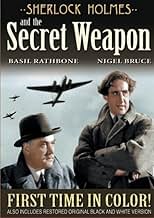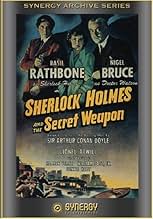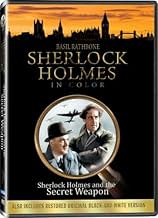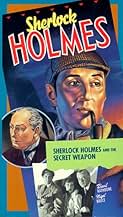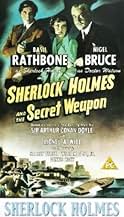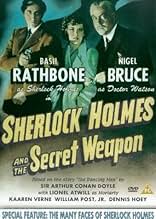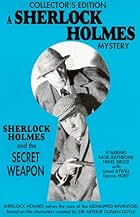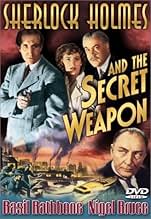Sherlock Holmes and Doctor Watson must protect a Swiss inventor of an advanced bomb sight from falling into German hands.Sherlock Holmes and Doctor Watson must protect a Swiss inventor of an advanced bomb sight from falling into German hands.Sherlock Holmes and Doctor Watson must protect a Swiss inventor of an advanced bomb sight from falling into German hands.
Karen Verne
- Charlotte Eberli
- (as Kaaren Verne)
Rudolph Anders
- Braun
- (uncredited)
Ted Billings
- Barfly
- (uncredited)
Whit Bissell
- London Bobbie
- (uncredited)
Veda Ann Borg
- Bar Singer
- (voice)
- (uncredited)
Paul Bryar
- Swiss Waiter
- (uncredited)
John Burton
- RAF Officer
- (uncredited)
Vicki Campbell
- Woman RAF Pilot
- (uncredited)
Gerard Cavin
- Scotland Yard Man
- (uncredited)
Harry Cording
- Jack Brady
- (uncredited)
James Craven
- RAF Officer Watching Bombsight Test
- (uncredited)
Featured reviews
There are times when Holmes and Watson seem just a bit out of place in the World War II setting, but "Sherlock Holmes and the Secret Weapon" still has enough of the Holmes flavor to be worth watching. It's mostly enjoyable, with Holmes's usual deductions, disguises, and the like making up for the occasional war-time messages that come in from time-to-time. There are also some good moments of suspense, plus some pleasantly offbeat plot details, to keep your attention.
The plot gets pretty involved, with Holmes involved in protecting an inventor whose ideas the Nazis would like to get hold of. Some good turns follow as everything is played out in an interesting battle of wits. The supporting cast includes Lionell Atwill and Dennis Hoey, who are solid as Moriarty and Lestrade, respectively, plus Kaaren Verne.
Overall, most fans of the Rathbone/Bruce series should find it an enjoyable feature.
The plot gets pretty involved, with Holmes involved in protecting an inventor whose ideas the Nazis would like to get hold of. Some good turns follow as everything is played out in an interesting battle of wits. The supporting cast includes Lionell Atwill and Dennis Hoey, who are solid as Moriarty and Lestrade, respectively, plus Kaaren Verne.
Overall, most fans of the Rathbone/Bruce series should find it an enjoyable feature.
Sherlock Holmes (Basil Rathbone) and Dr. Watson (Nigel Bruce) have been hired by the British government to protect a Swiss scientist Dr. Franz Tobel (William Post Jr.). He has a bomb that the British want to win the war. Unfortunately the evil Dr. Moriarty (Lionel Atwill) is working with the Nazis and will stop at nothing to get the doctor--and his invention.
Moving Sherlock Holmes to the 1940s sounded like a stupid idea but it does work for one reason--Basil Rathbone. Arguably he is the BEST Sherlock Holmes ever put on the screen. He plays the character so well (and accurately) that it doesn't matter what era he's solving crimes. As for Nigel Bruce as Watson...everybody has problems with it. He plays Watson as a bumbling old fool...that is NOT the Watson of the books. You seriously wonder why Holmes puts up with him. Still, he does grow on you (in a way). Then there's Atwill having a whale of a time playing Moriarty--the discussions and battle of wits between him and Holmes are just great! I've never liked Dennis Hoey as Inspector Lestrade--he's such an idiot. Makes Watson look like a genius. And Post Jr. is pretty good as Tobel (even though his accent amusingly keeps changing!).
This movie is done elaborately and runs only a little over an hour. Still, it does have it's slow spots and I never understood the secret code section.
Still, worth catching if just for Rathbone and Atwill.
Moving Sherlock Holmes to the 1940s sounded like a stupid idea but it does work for one reason--Basil Rathbone. Arguably he is the BEST Sherlock Holmes ever put on the screen. He plays the character so well (and accurately) that it doesn't matter what era he's solving crimes. As for Nigel Bruce as Watson...everybody has problems with it. He plays Watson as a bumbling old fool...that is NOT the Watson of the books. You seriously wonder why Holmes puts up with him. Still, he does grow on you (in a way). Then there's Atwill having a whale of a time playing Moriarty--the discussions and battle of wits between him and Holmes are just great! I've never liked Dennis Hoey as Inspector Lestrade--he's such an idiot. Makes Watson look like a genius. And Post Jr. is pretty good as Tobel (even though his accent amusingly keeps changing!).
This movie is done elaborately and runs only a little over an hour. Still, it does have it's slow spots and I never understood the secret code section.
Still, worth catching if just for Rathbone and Atwill.
The first two Rathbone/Bruce movies were pretty good. Not just because they were in period but because their production values were good and because some effort went into the script. Only the first, "The Hound of the Baskervilles", was based on a Conan-Doyle novella. The second was a pastiche made famous on the stage by Gillette.
Then the franchise was moved to Universal Studios and a series of mostly declining quality was established. This was an early example. It's not terrible, not embarrassingly bad, it just loses something in being updated to the 1940s and in not having the atmosphere Conan-Doyle managed to inject into his characters and into the atmosphere itself. Not to mention some of Conan-Doyle's sometimes unwittingly delicious bon mots -- "The wind sobbed like a child in the chimney."
"The Secret Weapon" doesn't tell us much we don't already know about Holmes and Watson. There is a variation on Conan-Doyle's "Dancing Men" but not really much else that's too interesting. I never cared much for Lionel Atwill as an actor, and he looks especially clunky as Moriarty. Moriarty should be a reptilian ectomorph with an oscillating head.
Still, this is okay for fans of the series. Homes wears his hair combed from back to front on the sides, which is a little different. I wish the code had allowed him to do some cocaine once in a while. The best of the Universal films was unquestionably "The Scarlet Claw," so if you have to choose, choose that one to watch.
Then the franchise was moved to Universal Studios and a series of mostly declining quality was established. This was an early example. It's not terrible, not embarrassingly bad, it just loses something in being updated to the 1940s and in not having the atmosphere Conan-Doyle managed to inject into his characters and into the atmosphere itself. Not to mention some of Conan-Doyle's sometimes unwittingly delicious bon mots -- "The wind sobbed like a child in the chimney."
"The Secret Weapon" doesn't tell us much we don't already know about Holmes and Watson. There is a variation on Conan-Doyle's "Dancing Men" but not really much else that's too interesting. I never cared much for Lionel Atwill as an actor, and he looks especially clunky as Moriarty. Moriarty should be a reptilian ectomorph with an oscillating head.
Still, this is okay for fans of the series. Homes wears his hair combed from back to front on the sides, which is a little different. I wish the code had allowed him to do some cocaine once in a while. The best of the Universal films was unquestionably "The Scarlet Claw," so if you have to choose, choose that one to watch.
This jingoist outing concerns the usual battle Holmes vs. Moriaty , but this time in an effort to save the British war against the Nazis . Sherlock Holmes (Rathbone) and Watson (Bruce), the detecting duo living in 223 Baker Street , again are up against their old enemy Dr. James Moriarty (Lionel Atwill , he earlier performed Mortimer in Hound of the Baskerville , 1939). The film starts in Switzerland where Holmes saves from the Nazis to an inventor scientific of a bomb-sight , named Dr. Tobel (Post). Back in London , Tobel hand over four parts of the device to diverse scientists . But Doctor Tobel is kidnapped by Moriarty . Sherlock must solve his disappearance and some vitally important . Sherlock helps Inspector Lestrade of Scotland Yard (Dennis Hoey , this was was the first of Universal's Sherlock Holmes series in which he appeared) resolve the case . Holmes only holds a clue left by his girlfriend (Kareen Verne) , the detective with an extraordinary mechanism gets decode it . But scientists dead bodies are accumulating , they have appeared murdered and Moriarty knows the keys , as well . Holmes disguised as a sailor goes out to investigate , finding the Moriarty's shelter . The picture is based on ¨The dancing men¨ by Arthur Conan Doyle . This is a Rathbone-Bruce effort for the WWII along with ¨The voice of terror¨ in which we are asked for believe the magnificent detective could have lived in this century . Both stories are completely patriotic and flag-waging movies . In fact , on the end there's an advertising about buying of war bonds with evident propaganda .
The movie is an excellent Holmes thriller with gripping wartime setting , unanswered mysteries and unstopped suspense . In the film appears the ordinaries from Holmes series : his nemesis Moriarty , Mistress Hudson , Inspector Lestrade (a funny Dennis Hoey) and , of course , the bumbling Dr. Watson . Basil Rathbone performance is splendid , he's the best cinema's Holmes , similar to television's Peter Cushing and Jeremy Brett . Rathbone as whimsical sleuth is top notch , he's in cracking form , intelligent , broody and impetuous . He's finely matched in battle of wits with Moriarty , his arch-enemy , a first-range villain : Lionel Atwill . Nigel Bruce plays Watson with humor , jinx , goofy and mirth . He's the perfect counterpoint to Holmes. Besides , appearing briefly distinguished secondaries as Paul Fix and Whit Bissell . This classic gets an atmospheric black and white cinematography , but available colorized in a horrible version . Adequate music score fitting to suspense by Frank Skinner . This was the second Holmes feature to be produced and professionally realized at Universal and it was the first to be directed by Roy William Neill , the usual saga director and habitual in the Universal monsters movies .
The movie is an excellent Holmes thriller with gripping wartime setting , unanswered mysteries and unstopped suspense . In the film appears the ordinaries from Holmes series : his nemesis Moriarty , Mistress Hudson , Inspector Lestrade (a funny Dennis Hoey) and , of course , the bumbling Dr. Watson . Basil Rathbone performance is splendid , he's the best cinema's Holmes , similar to television's Peter Cushing and Jeremy Brett . Rathbone as whimsical sleuth is top notch , he's in cracking form , intelligent , broody and impetuous . He's finely matched in battle of wits with Moriarty , his arch-enemy , a first-range villain : Lionel Atwill . Nigel Bruce plays Watson with humor , jinx , goofy and mirth . He's the perfect counterpoint to Holmes. Besides , appearing briefly distinguished secondaries as Paul Fix and Whit Bissell . This classic gets an atmospheric black and white cinematography , but available colorized in a horrible version . Adequate music score fitting to suspense by Frank Skinner . This was the second Holmes feature to be produced and professionally realized at Universal and it was the first to be directed by Roy William Neill , the usual saga director and habitual in the Universal monsters movies .
It was an interesting enough idea, I suppose, to set a series of Sherlock Holmes films in the "modern day"...at the time, the WWII era...but those who are familiar with the first two Rathbone/Bruce films might be thrown off by it. When the rights passed from Fox to Universal, the two stars were retained, but apparently our two heroes stepped through a hole in the space-time continuum. The Fox films were Victorian period pieces, whereas Universal took the opportunity to utilize Sherlock Holmes in the series of modern-day B-movies into which this entry falls, several of which were fairly standard wartime propaganda...pretty much the order of the day for Hollywood films circa 1942-1945.
While the film may boast some entertainment value, the plot is actually quite silly. Sherlock Holmes (sporting a remarkably bad haircut) has been charged with the task of guarding Dr. Franz Tobel, the inventor of a bomb sight (which, when you see it, will give you an idea of what the film's budget was) that will apparently revolutionize airborne warfare. Holmes's task is to keep Tobel safe (at which he fails) and to keep the bomb sight out of the hands of the Nazis. When Tobel is abducted, Holmes must unravel a coded message before his arch-nemesis, Professor Moriarty does. Though the credits state that the film is an adaptation of Conan Doyle's story, The Dancing Men, only the code itself is taken from said story. And a small reference to another story, The Empty House, also shows up early in the film. Apart from that, you'll find no Conan Doyle here.
Interestingly enough, what makes Tobel's bomb sight so remarkable, apart from the fact that the bombs seem to land where they're supposed to, is never expounded upon...leaving the viewer to assume that both Allied and German bomb sights were abysmally inaccurate, as both sides are clamoring to get their hands on one that actually works. Probably not the best way to bolster confidence in the Allied fighting machine...but then, logic is scarce in this outing. Holmes relies just as heavily upon chance and educated guesses as he does upon deduction, and it's the bumbling Watson (who was never bumbling in the original stories) who inadvertently provides the solution to the major stumbling block (despite the fact that the solution should have been obvious to someone as brilliant as Sherlock Holmes).
All in all, this film has its moments, but fails to live up to the legend of the world's greatest detective. Rathbone is a fine Holmes and Bruce (despite the almost unforgivable dumbing down of the Watson character) does a good job, as well. But much of the supporting cast seem to be phoning in their performances. The production values are rather noticeably low and the script is fairly ludicrous. I still watch this one from time to time, and certainly prefer it over Sherlock Holmes and the Voice of Terror (the first Universal Holmes entry)...but I can't help but think that Sherlock Holmes deserves better than this.
Interesting sidenote - This film contains the series' one and only reference to Sherlock Holmes's hypodermic cocaine usage. As Holmes is describing to Moriarty an elaborate hypothetical death scenario involving an intravenous needle, Moriarty interjects "The needle to the last...eh, Holmes?" How this managed to slip by the censors at the Breen Office (which, at the time, strictly forbade such references) is perhaps the one great mystery to be found in this film.
While the film may boast some entertainment value, the plot is actually quite silly. Sherlock Holmes (sporting a remarkably bad haircut) has been charged with the task of guarding Dr. Franz Tobel, the inventor of a bomb sight (which, when you see it, will give you an idea of what the film's budget was) that will apparently revolutionize airborne warfare. Holmes's task is to keep Tobel safe (at which he fails) and to keep the bomb sight out of the hands of the Nazis. When Tobel is abducted, Holmes must unravel a coded message before his arch-nemesis, Professor Moriarty does. Though the credits state that the film is an adaptation of Conan Doyle's story, The Dancing Men, only the code itself is taken from said story. And a small reference to another story, The Empty House, also shows up early in the film. Apart from that, you'll find no Conan Doyle here.
Interestingly enough, what makes Tobel's bomb sight so remarkable, apart from the fact that the bombs seem to land where they're supposed to, is never expounded upon...leaving the viewer to assume that both Allied and German bomb sights were abysmally inaccurate, as both sides are clamoring to get their hands on one that actually works. Probably not the best way to bolster confidence in the Allied fighting machine...but then, logic is scarce in this outing. Holmes relies just as heavily upon chance and educated guesses as he does upon deduction, and it's the bumbling Watson (who was never bumbling in the original stories) who inadvertently provides the solution to the major stumbling block (despite the fact that the solution should have been obvious to someone as brilliant as Sherlock Holmes).
All in all, this film has its moments, but fails to live up to the legend of the world's greatest detective. Rathbone is a fine Holmes and Bruce (despite the almost unforgivable dumbing down of the Watson character) does a good job, as well. But much of the supporting cast seem to be phoning in their performances. The production values are rather noticeably low and the script is fairly ludicrous. I still watch this one from time to time, and certainly prefer it over Sherlock Holmes and the Voice of Terror (the first Universal Holmes entry)...but I can't help but think that Sherlock Holmes deserves better than this.
Interesting sidenote - This film contains the series' one and only reference to Sherlock Holmes's hypodermic cocaine usage. As Holmes is describing to Moriarty an elaborate hypothetical death scenario involving an intravenous needle, Moriarty interjects "The needle to the last...eh, Holmes?" How this managed to slip by the censors at the Breen Office (which, at the time, strictly forbade such references) is perhaps the one great mystery to be found in this film.
Storyline
Did you know
- TriviaThe set used for Prof. Moriarty's hideout was used as a pub/bar in Sherlock Holmes and the Voice of Terror (1942).
- GoofsWhile Holmes is in Switzerland, disguised as a book collector, he drives in a car with the steering wheel located on the right side while driving on the left side of the road. In Switzerland (and in Germany, as well, so "the Nazi's own car" would also be configured the same way), people drive cars on the right side with steering wheels mounted on the left side. The only areas of Europe where cars are right-hand-drive and occupy the left-hand lane are the British Isles and Gibraltar. A probable explanation for this apparent discrepancy is the film's overall British overtone --- the tale's primary setting is London and many of the lead actors are from England, so this is likely why British-configured cars were used.
- Quotes
Professor Moriarty: Brilliant man, Sherlock Holmes. Too bad he was honest.
- Crazy creditsOpening credits prologue: SWITZERLAND
- Alternate versionsAlso available in a computer-colorized version.
- ConnectionsEdited into Who Dunit Theater: Sherlock Holmes and the Secret Weapon (2016)
- SoundtracksRule Britannia
(1740) (uncredited)
Music by Thomas Augustine Arne
Played in the score when London is shown
- How long is Sherlock Holmes and the Secret Weapon?Powered by Alexa
Details
- Release date
- Country of origin
- Languages
- Also known as
- Secret Weapon
- Filming locations
- Production company
- See more company credits at IMDbPro
- Runtime1 hour 8 minutes
- Color
- Aspect ratio
- 1.37 : 1
Contribute to this page
Suggest an edit or add missing content

Top Gap
What is the German language plot outline for Sherlock Holmes and the Secret Weapon (1942)?
Answer

